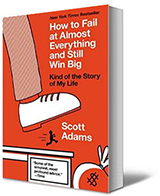Here are my notes on “How to Fail at Almost Everything and Still Win Big: Kind of the Story of My Life” by Scott Adams
Scott Adams is the author of the world famous Dilbert comic strip that make fun of life in an office cubicle.
Like his comic strip, this book is certainly amusing. He is a great story teller in super-short-form comics in which he has only a few panels, and in this long-form book in which he has hundreds of pages.
He has led an interesting life, and tells those stories and the lessons he learnt, but even more interestingly, he shares several counter-intuitive ideas that I’d like to share with you today.
On Passion
Passionate people are more likely to take big risks in the pursuit of unlikely goals, and so you would expect to see more failures and more huge successes among the passionate.
Passionate people who fail don’t get a chance to offer their advice to the rest of us. But successful passionate people are writing books and answering interview questions about their secrets for success every day.
Naturally those successful people want you to believe that success is a product of their awesomeness, but they also want to retain some humility.
You can’t be humble and say “I succeeded because I am far smarter than the average person.”
But you can say your passion was a key to your success, because everyone can be passionate about something or other.
Passion sounds more accessible.
If you’re dumb, there’s not much you can do about it, but passion is something we think anyone can generate in the right circumstances.
Passion feels very democratic. It is the people’s talent, available to all.
It’s also mostly bullshit.
On The Value of Good Ideas
Good ideas have no value because the world already has too many of them.
The market rewards execution, not ideas.
From that point on, I concentrated on ideas I could execute.
On Job Interviews
My failure taught me to seek opportunities in which I had an advantage.
On Timing
Timing is often the biggest component of success. And since timing is often hard to get right unless you are psychic, it makes sense to try different things until you get the timing right by luck.
On Investing
… Webvan went out of business. Investing in Webvan wasn’t the dumbest thing I’ve ever done, but it’s a contender. The loss wasn’t enough to change my lifestyle. But boy, did it sting psychologically. In my partial defense, I knew it was a gamble, not an investment per se.
What I learned from that experience is that there is no such thing as useful information that comes from a company’s management.
Now I diversify and let the lying get smoothed out by all the other variables in my investments.
On Goal Setting vs Systems
… He said that every time he got a new job, he immediately started looking for a better one.
For him, job seeking was not something one did when necessary. It was an ongoing process.
This makes perfect sense if you do the math.
Chances are the best job for you won’t become available at precisely the time you declare yourself ready.
Your best bet, he explained, was to always be looking for the better deal.
The better deal has its own schedule.
I believe the way he explained it is that your job is not your job; your job is to find a better job.
This was my first exposure to the idea that one should have a system instead of a goal.
To put it bluntly, goals are for losers.
That’s literally true most of the time.
For example, if your goal is to lose ten pounds, you will spend every moment until you reach the goal—if you reach it at all—feeling as if you were short of your goal.
Goal-oriented people exist in a state of continuous presuccess failure at best, and permanent failure at worst if things never work out.
Systems people succeed every time they apply their systems, in the sense that they did what they intended to do.
The goals people are fighting the feeling of discouragement at each turn.
The systems people are feeling good every time they apply their system.
In the world of dieting, losing twenty pounds is a goal, but eating right is a system. In the exercise realm, running a marathon in under four hours is a goal, but exercising daily is a system.
In business, making a million dollars is a goal, but being a serial entrepreneur is a system.
If you do something every day, it’s a system. If you’re waiting to achieve it someday in the future, it’s a goal.
On Success
One of the best pieces of advice I’ve ever heard goes something like this: If you want success, figure out the price, then pay it.
It sounds trivial and obvious, but if you unpack the idea it has extraordinary power.
Successful people don’t wish for success; they decide to pursue it.
And to pursue it effectively, they need a system.
Success always has a price, but the reality is that the price is negotiable.
If you pick the right system, the price will be a lot nearer what you’re willing to pay.
Your Thoughts?
Have your say in the comments below.
